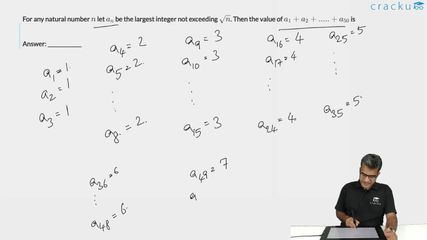Sign in
Please select an account to continue using cracku.in
↓ →
For any natural number $$n$$ let $$a_{n}$$ be the largest integer not exceeding $$\sqrt{n}$$. Then the value of $$a_{1}+a_{2}+.....+a_{50}$$ is
Correct Answer: 217
We are told that, for any natural number $$n_{1}$$ let $$a_{n}$$ be the largest integer not exceeding $$\sqrt{n}$$
So for n=1, the largest integer not exceeding $$\sqrt{1}$$ will be 1
For n=2, the largest integer not exceeding $$\sqrt{2}$$ will be 1
For n=3, the largest integer not exceeding $$\sqrt{3}$$ will be 1
For n=4, the largest integer not exceeding $$\sqrt{4}$$ will be 2
We see a pattern here regarding the squares of the numbers,
Listing down all the perfect squares,
1, 4, 9, 16, 25, 36, 49, 64, ...
We see that the difference between 4 and 1 is 3 and there were three natural numbers in the given pattern with the value as 1,
So we can write for the rest of the numbers as well,
3 numbers will have value 1, giving a total value of 3
5 numbers will have value 2, giving a total value of 10
7 numbers will have value 3, giving a total value of 21
9 numbers will have value 4, giving a total value of 36
11 numbers will have value 5, giving a total value of 55
13 numbers will have value 6, giving a total value of 78
Now, only the values of $$a_{49},\ a_{50}$$ will have the value of 7, total value of 14.
Adding these values, we get the total sum as 217, which is the answer.

Click on the Email ☝️ to Watch the Video Solution
Create a FREE account and get:
Educational materials for CAT preparation